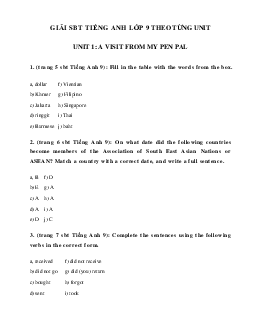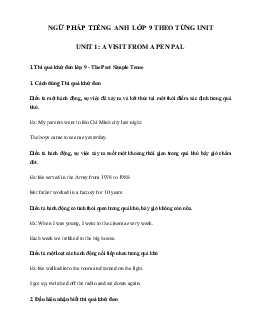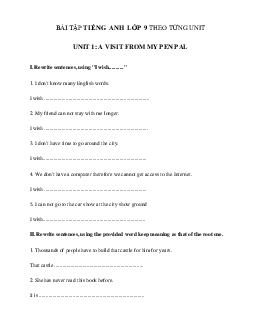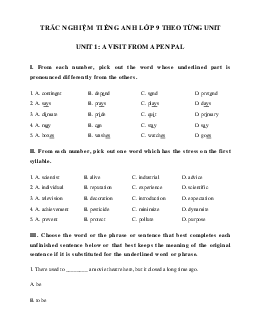







Preview text:
NGỮ PHÁP TIẾNG ANH LỚP 9 THEO TỪNG UNIT
UNIT 1: A VISIT FROM A PEN PAL
I. Thì quá khứ đơn lớp 9 - The Past Simple Tense
1. Cách dùng Thì quá khứ đơn
Diễn tả một hành động, sự việc đã xảy ra và kết thúc tại một thời điểm xác định trong quá khứ.
Ex: My parents went to Ho Chi Minh city last night.
The boys came to see me yesterday.
Diễn tả hành động, sự việc xảy ra suốt một khoảng thời gian trong quá khứ bây giờ chấm dứt.
Ex: He served in the Army from 1978 to 1988.
Her father worked in a factory for 10 years.
Diễn tả hành động có tính thói quen trong quá khứ, bây giờ không còn nữa.
Ex: When I was young, I went to the cinema every week.
Each week we trekked to the big house.
Diễn tả một loạt các hành động nối tiếp nhau trong quá khứ
Ex: He walked into the room and turned on the light.
I got up, switched off the radio and sat down again.
2. Dấu hiệu nhận biết thì quá khứ đơn
Thường có các trạng từ chỉ thời gian đi liền với thì:
• yesterday, yesterday morning/ afternoon/ evening
• last night/ week/ month/ year
• last + thứ trong tuần: Monday, Tuesday ... ; last Monday ....
• last + mùa trong năm: summer, fall ... ; last summer ...
• in + năm đã qua: 1988, 2008 .....; in 2008 ...
• khoảng thời gian + ago (a week ago, two days ago ...)
• the other day (ngày nọ)
3. Cấu trúc thì Quá khứ đơn
Thì quá khứ đơn được chia làm ba thể:
a. Affirmative form (Th ể khẳng định)
* Đối với động từ To be: S + WERE/ WAS ...
Nếu chủ ngữ là: I/ he/ she/ it và danh từ số ít: was
Nếu chủ ngữ là: we/ they/ you và danh từ số nhiều: were Ex: I was at home last night.
My parents were at school yesterday.
* Đối với những động từ thường có quy tắc, thường thêm ed Ex: clean → cleaned
Nếu động từ tận cùng là e, ta chỉ thêm d mà thôi. Ex: live → lived
Nếu động từ tận cùng là một phụ âm + y, đổi y thành i + ed Ex: study → studied
Nếu động từ có một âm tiết mà tận cùng là một nguyên âm + phụ âm (ngoại trừ phụ âm w,
y) ta gấp đôi phụ âm rồi thêm ed Ex: stop → stopped
* Đối với những động từ bất quy tắc: học thuộc lòng theo bảng động từ bất quy tắc
và sử dụng đúng hình thức quá khứ của nó ở cột hai.
Ex: My father bought a new car yesterday.
b. Negative form (Th ể phủ định)
* Đối với động từ To be: S + WERE/ WAS + NOT ...
Ex: She was not at home yesterday.
* Đối với tất cả động từ thường và động từ bất quy tắc, ta dùng: S + DID NOT + V(inf) ...
Ex: I did not see her in school yesterday afternoon.
c. Interrogative form (Thể nghi vấn)
* Đối với động từ To be: WAS/ WERE + S ....?
Ex: Were you at club last night?
Với câu hỏi có từ để hỏi: Where, When, Why, ....
WHERE/ WHEN/ WHY + WAS/ WERE + S ....? Ex: When were you there?
* Đối với động từ thường: DID + S + V(infinitive)....?
Ex: Did you go to the cinema last night?
Với câu hỏi có từ để hỏi:
WHEN/ WHERE/ WHY + DID + S + V(inf) ...?
Ex: Where did you go last night?
4. Cách phát âm đuôi ed
Những động từ có quy tắc tận cùng là âm /t/ và /d/, khi thêm đuôi ed ta đọc là /id/
need /ni:d/ --> needed /ni:did/
Những động từ có quy tắc tận cùng là âm /k/, /p/, /f/, /s/, ch, sh khi thêm đuôi ed, ta đọc là /t/
laugh /la:f/ --> laughed /la:ft/
Những động từ có quy tắc kết thúc là những âm còn lại, khi thêm đuôi ed, ta đọc là /d/
played /plei/--> played /pleid/
II. Thì quá khứ đơn trong mệnh đề Wish - The simple past tense in wish sentence
Câu mong ước được dùng khi người nói mong ước điều trái ngược với thực tế
1. Mong ước ở hiện tại (mong thay đổi việc gì ở hiện tại):
S(1) + WISH/ WISHES + S(2) + V (past simple) ....
Lưu ý: Động từ tobe chỉ dùng dạng were
Ex: I don't have enough time to finish my exam.
--> I wish I had enough time to finish my exam.
2. Mong ước trong tương lai (mong điều gì sẽ xảy ra hoặc muốn ai đó làm
việc gì trong tương lai):
S(1) + WISH/ WISHES + S(2) + WOULD/ COULD + V .... Ex: She will not tell me.
--> I wish she would tell me.
3. Mong ước trong quá khứ (thể hiện sự hối tiếc điều gì đã xảy ra trong quá khứ):
S(1) + WISH/ WISHES + S(2) + HAD + P2 ...
Ex: I wish I hadn't eaten so much ice cream. (= but I ate so much ice cream)
III. Bài tập vận dụng
Put the verb in past simple tense
Two people (0. die) died in a fire in Ellis Street, Oldport yesterday morning. They (1. be)
………… Herbert and Molly Paynter, a couple in their seventies. The fire (2. start)
………… at 3.20 a.m. A neighbour, Mr. Aziz, (3. see) ………… the flames and (4. call)
………… the fire brigade. He also (5. try) ………… to get into the house and rescue his
neighbours, but the heat (6. be) ………… too great. The fire brigade (7. arrive) ………… in
five mintues. Twenty fire-fighters (8. fight) ………… the fire and finally (9. bring)
………… it under control. Two fire-fighters (10. enter) ………… the burning building but they found the couple dead. Đáp án
Two people (0. die) died in a fire in Ellis Street, Oldport yesterday morning. They (1. be)
……were…… Herbert and Molly Paynter, a couple in their seventies. The fire (2. start)
……started…… at 3.20 a.m. A neighbour, Mr. Aziz, (3. see) ……saw…… the flames and
(4. call) ……called…… the fire brigade. He also (5. try) ……tried…… to get into the house
and rescue his neighbours, but the heat (6. be) ……was…… too great. The fire brigade (7.
arrive) ……arrived…… in five mintues. Twenty fire-fighters (8. fight) ……fought…… the
fire and finally (9. bring) ……brought…… it under control. Two fire-fighters (10. enter)
……entered…… the burning building but they found the couple dead.
Choose the correct form of “used to”
1. They are used to/ used to cooking for themselves when they get home from school
2. Do you remmember how we used to/ are used to listen to music all the time?
3. Were you used to/ Did you use to spend hours in front of the mirror when you were young?
4. This is used to/ used to be an industrial area.
5. The children didn’t use to/ aren’t used to going to bed so late
6. He is used to/ used to working at night
7. I didn’t use to/ wasn’t used to like classical music. Đáp án
1. They are used to cooking for themselves when they get home from school
2. Do you remmember how we used to listen to music all the time?
3. Did you use to spend hours in front of the mirror when you were young?
4. This used to be an industrial area.
5. The children aren’t used to going to bed so late
6. He is used to working at night
7. I didn’t use to like classical music.
Rewrite the sentences using “I wish”
1. I hate having to go to school on Saturdays.
….……………………………………………………..
2. John doesn’t help his wife with housework.
….……………………………………………………..
3. I decided to work in London.
….……………………………………………………..
4. I’d like Jame to give up smoking.
….……………………………………………………..
5. Susan isn’t working very hard for her exam.
….…………………………………………………….. Đáp án
1. I wish I hadn’t to go to school on Saturdays.
2. I wish John helped his wife with housework.
3. I wish I hand’t decide to work in London.
4. I wish Peter gave up smoking.
5. I wish Susan was working very hard for her exam.
Fill in each gap with a suitable preposition
1. Mary was really impressed ………… the beauty of Hue
2. It seems difficult ………… us to have a trip aboard at the moment.
3. Whether you stay ………… me or not depends ………… your parents.
4. If you have a problem, ask ………… help.
5. This guide book is full ………… useful information.
6. We still keep in touch ………… each other although we live away ………… each other. Đáp án
1. Mary was really impressed ……of…… the beauty of Hue
2. It seems difficult ……for…… us to have a trip aboard at the moment.
3. Whether you stay ……with…… me or not depends ……on…… your parents.
4. If you have a problem, ask ……for…… help.
5. This guide book is full ……of…… useful information.
6. We still keep in touch ……with…… each other although we live away …from……… each other.



